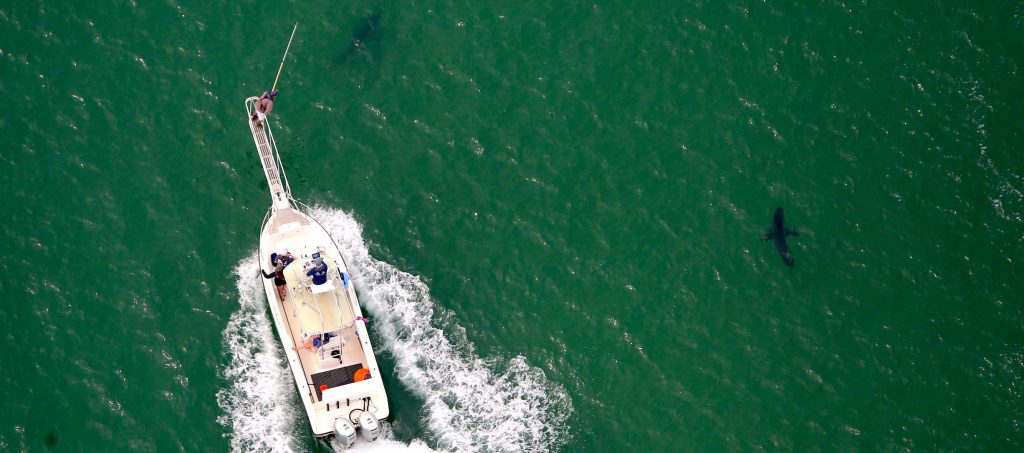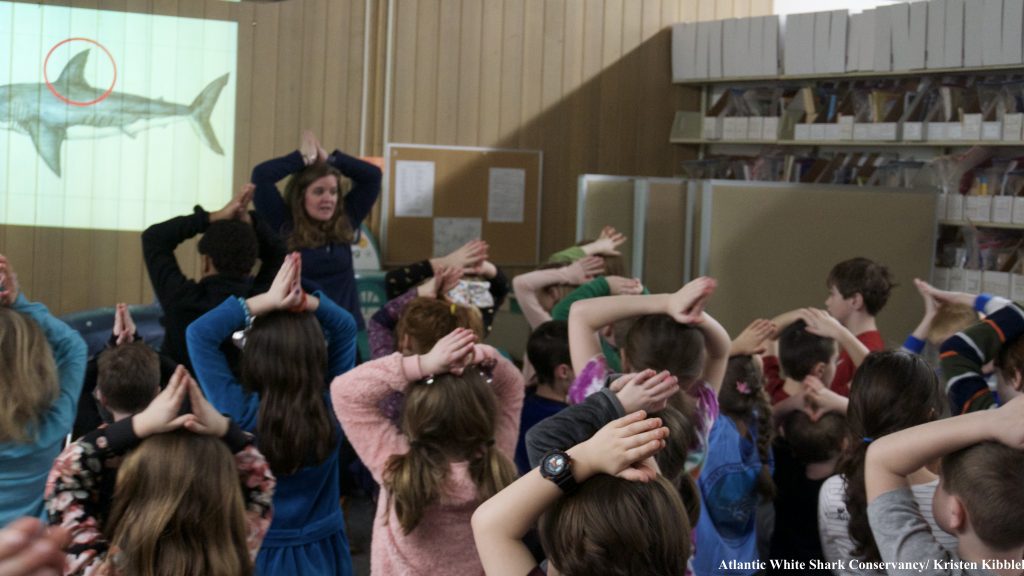Shark Research: The Rewilding of Cape Cod

A fatal shark attack in Wellfleet on Cape Cod in 2018 has heightened the focus on protecting beachgoers from sharks. While the means of doing that is a subject of intense debate, many proposed actions involved new technologies and the need for increased awareness of sharks in the environment.
Three new research projects funded by Woods Hole Sea Grant focus on white sharks and human interactions will add to our understanding of these interactions and to the range of solutions to keep individuals safe from sharks while at the beach.
“There is no one solution that can guarantee individuals will always be safe when they go into the water,” says Woods Hole Sea Grant director Matt Charette. “We need to approach this issue from multiple directions, and these new projects will provide science-based resources to understanding shark behavior as well as human perceptions and understanding of sharks and seals in addressing this problem.”
Research
The projects are:
» Development and Testing of a Near-real-time White Shark Forecast System for Cape Cod Massachusetts
Megan Winton, a research scientist with the Atlantic White Shark Conservancy (AWSC), and Greg Skomal, a biologist with Massachusetts Division of Marine Fisheries who has been studying white sharks for a decade, will develop and evaluate near real-time ‘shark forecast’ maps that can be disseminated by town and beach managers and via the AWSC’s ‘Sharktivity’ app to alert beachgoers when conditions indicate a high probability of white shark presence.
The concept is based on acoustic telemetry data from tagged sharks and satellite-derived sea surface temperature (SST) and water turbidity data. Available tagging data suggest that temperature is a factor in the distribution of sharks, and that variations in ambient light levels due to cloud cover and water turbidity are linked to when and how the sharks hunt. The scientists plan to test the concept by retroactively forecasting the probability of white shark presence in previous years and validate it using available tagging data.
» Human Dimension of Rebounding Population of Seals and White Sharks on Cape Cod, MA
The increasing seal population has been targeted as one major cause of the influx of the sharks that prey on them. Gaining an understanding of what the public knows and understands about sharks and their seal prey underpins any strategy to change human behavior.
Jennifer Jackman, a professor of political science at Salem State University, who researches human dimensions of wildlife, will lead a collaborative research project to generate knowledge about the views and experiences of residents, tourists, and commercial and recreational fishers with regard to seals and sharks.
Working with collaborators at the Center for Coastal Studies (CCS), University of Massachusetts- Boston, Atlantic White Shark Conservancy (AWSC), Center for Animals and Public Policy of the Cummings School of Veterinary Medicine at Tufts University, and the Cape Cod Commercial Fishermen’s Alliance (CCCFA), the project will use a survey to measure experiences with seals, beliefs about seals and the impacts of seal-human interactions, and attitudes toward seal management as well as to measure values, perceptions and knowledge of sharks and attitudes toward human-shark conflict mitigation strategies. The understanding of the values, perceptions, and knowledge gained from the survey will enable managers, policy makers, and non-governmental organizations to develop appropriate messaging that advances wildlife conservation and responsible stewardship of the interfacing human and marine ecosystems.
Project Pages
» Development and testing of a near real-time white shark forecast system for Cape Cod, Massachusetts
NOAA Sea Grant biennial call for proposals, Feb. 2020
» Human Dimension of Rebounding Population of Seals and White Sharks on Cape Cod, Massachusetts
NOAA Sea Grant biennial call for proposals, Feb. 2020
Outreach

Understanding the Rewilding of Cape Cod: Creating a curriculum for middle school learners
Educating students is an important piece of addressing the shark-seal issue. Young people on Cape Cod are exposed to a wide variety of opinions about the problem, but are not always being exposed to science-based information about the species and their roles in our marine ecosystem.
In its 2020-2022 call for proposals, Woods Hole Sea Grant funded Marianne Long, education director, and Megan Winton, research scientist, with the Atlantic White Shark Conservancy, to develop a middle school level curriculum focused on the white shark - grey seal relationship and the associated challenge it presents for Cape Cod beachgoers. The curriculum will be informed by research scientists, teachers, and curriculum coordinators who will help develop and provide feedback on the lessons, activities and resources. The curriculum will be shared with teachers in the Cape Cod area through workshops and in-school visits. The curriculum aims to give students science-based facts and figures and enable them to develop a reasoned understanding of and engagement with the issue.
Related Stories
How Do Sharks Respond to Internal Waves in the Ocean
(Sept. 2019 Coastal Impacts newsletter)
